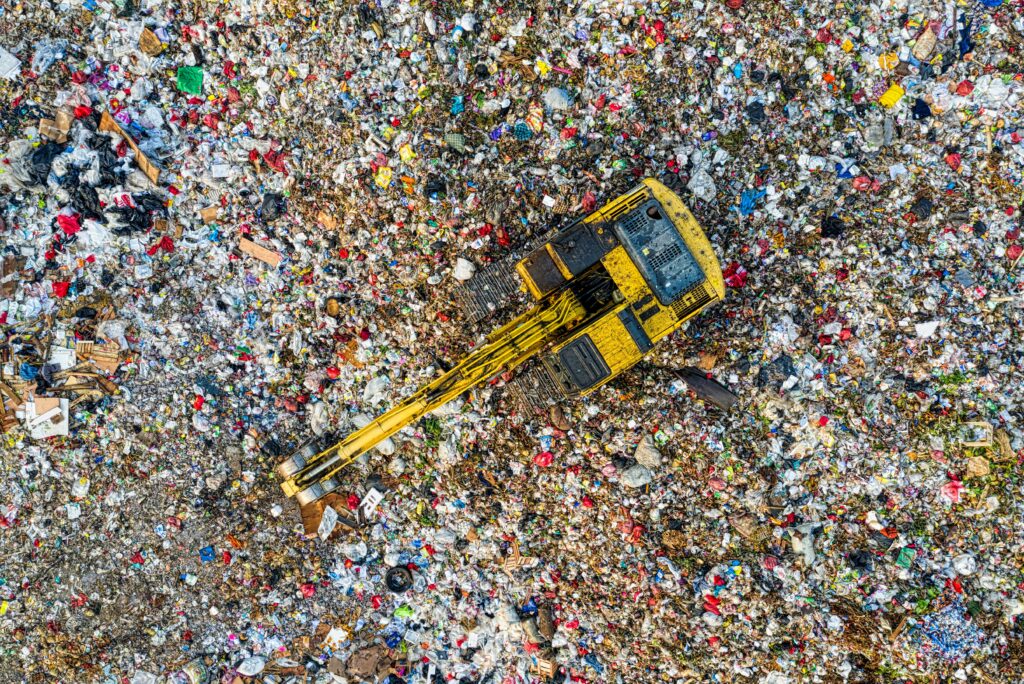A Guide to Landfills – What is a Landfill?

By now, we all know that we need to do everything we can to avoid waste being placed in landfills, but what exactly are landfills? This month at Woodford Recycling, we’re going to take you through what they are, how they impact the environment and where the most toxic landfills in England and Wales are.
But don’t worry, we’ll also be providing you with alternatives to landfills, too!
What are landfills?
Landfills are essentially just that – land that has been filled in with waste. These are sites that have often been quarried in the ground and then filled and covered, but sometimes they are areas where waste has been piled above-ground and land has been amassed around the site.
These days, landfill sites in the UK are reserved only for waste that cannot be recycled or reused in some way. However, there are still consequences of old landfill sites and the ones that still operate today…
Are landfills bad for the environment?
It should go without saying that simply burying waste underground is not a sustainable practice. It has been happening for decades and continues to this day.
Older landfills, created before more regulations were introduced, were used to bury any and all waste, including hazardous materials. These landfills still exist underground, which is a major worry for the environment as chemicals will be leached into the ground and methane released from decomposing organic matter – a huge contributor to global warming with more warming power than carbon dioxide.
Here are some of the other harmful effects landfills can have on the environment:
- They can destroy natural habitats for flora and fauna alike
- They tend to attract rats and birds, displacing the existing wildlife
- When it rains, harmful chemicals from the waste can end up in groundwater, rivers and streams, affecting aquatic wildlife
- They alter the chemical balance of soil, affecting vegetation and biodiversity in the area
What are toxic landfills?
Toxic landfills are those sites that are deemed to contain hazardous waste. According to research carried out this year by Uswitch into the areas with the most toxic landfills per km2, Sandwell District in the West Midlands tops the list, closely followed by Walsall District in the same region. Greater Manchester has the highest concentration of districts in the research of the top 20 for England.
It was also revealed in an investigation by the Guardian newspaper earlier this year that there are even sites in the UK where “the contents of hundreds of sites remain unknown”, something the government and the Environment Agency has said local councils are responsible for identifying, essentially placing sites in a state of limbo.
Alternatives to landfills
The silver lining here is that, more than ever, we’re all aware of how harmful even the most modern of landfill sites can be. We’re also aware that there is only a finite amount of land to continue this practice with, so the sooner we make the alternatives the norm, the better.
The best way to prevent waste from being dumped in a landfill is to follow the three Rs:
Reduce – As a species, we produce millions of tonnes of waste each year, so the first thing to do is try and reduce this figure. That means shunning single-use plastics when we’re shopping for anything, as well as becoming more strict with how much food we waste – we should only buy what we intend to use, making the next two stages even easier.
Reuse – The modern world moves quickly, but that doesn’t mean we should always jump to throw out old clothes, electronics and other items as soon as fashions change. Instead, buy things with the intention for them to last, or at least donate items you don’t want to charity, family members or list them on sites such as Facebook Marketplace and Gumtree so that someone else can reuse them.
Recycle – If you have to throw waste out, make sure you’re maximising the amount of recycling you’re doing. Plastics, card, paper and metals can be recycled by your local authority in one way or another, while composting your organic matter is also something you can either choose to do at home or with local council collections. You can also seek out local skip hire companies who commit to recycling your waste when you need to get rid of large amounts of waste at home, like Woodford Recycling.
If we all take these steps, the amount of waste that has to go to landfill sites will be drastically reduced.
Recycle with Woodford Recycling
With years of experience and investment in our own recycling facilities and associated services, here at Woodford Recycling, we’re committed to recycling 100% of the waste we collect from homes and businesses locally in Cambridge, Huntingdon and Peterborough. On top of this, we also offer national solutions, so wherever you are in the UK, you can make the most of our services and reduce your impact on the environment.
Contact us today to discuss skip hire, waste management and recycling and let’s work together to reduce the need for landfill sites here in the UK.

